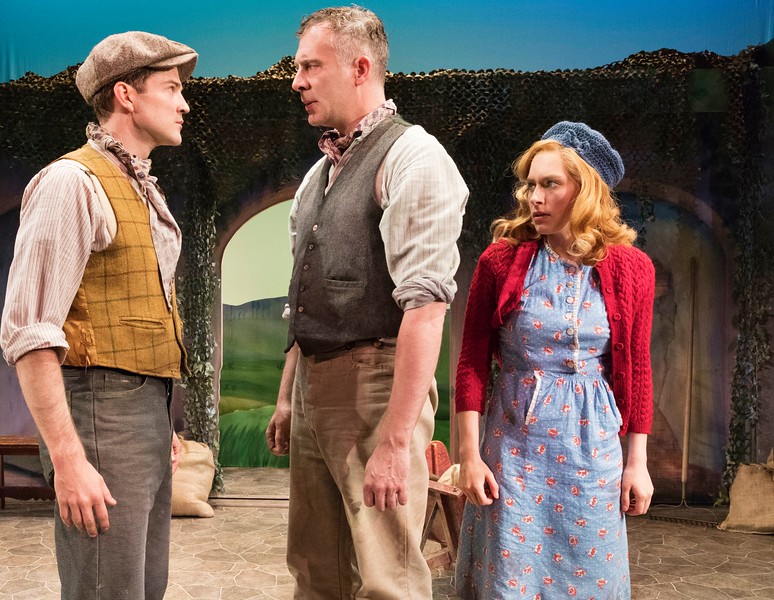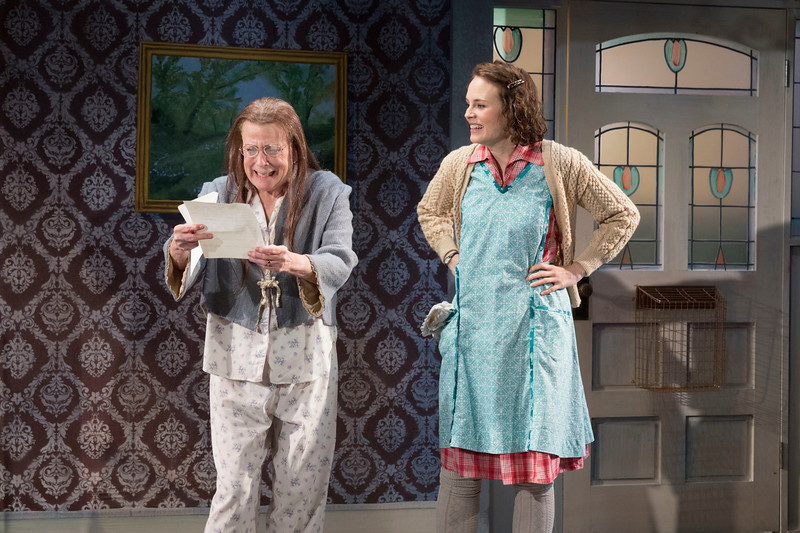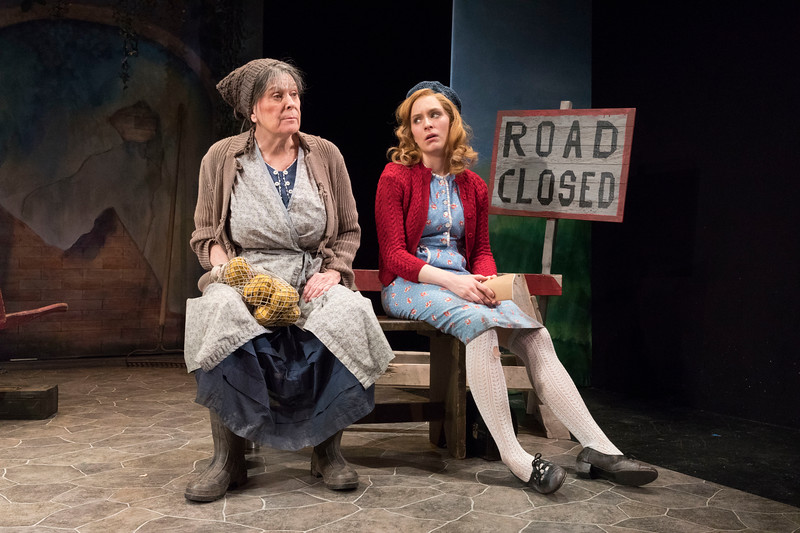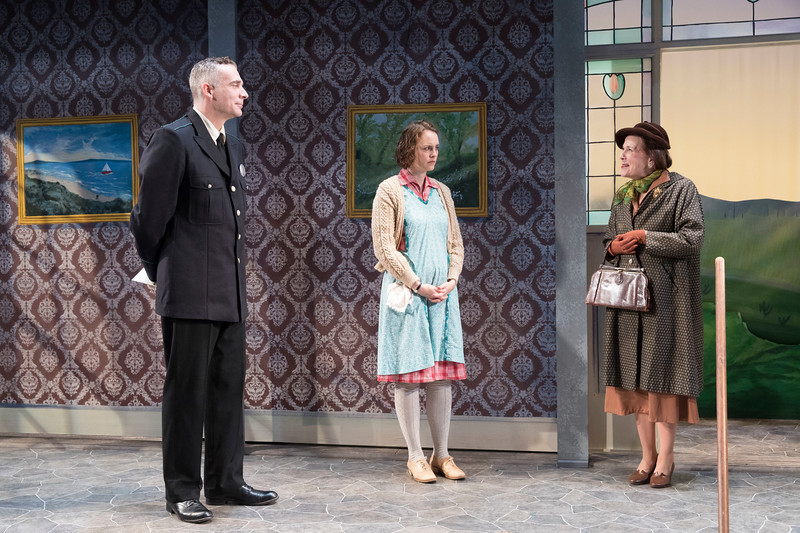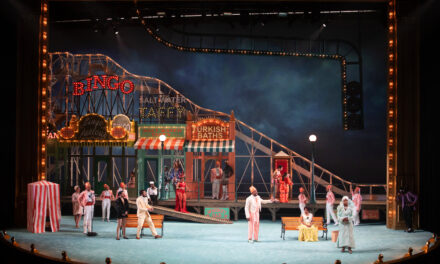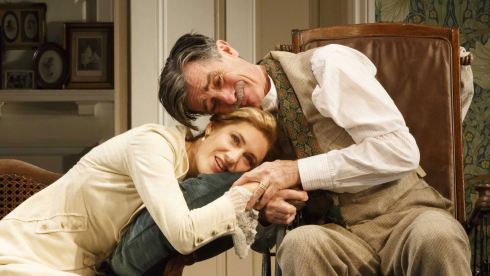By Marilyn Lester
Ireland has never had a shortage of literary greatness, a fact deftly demonstrated in the works of the “forgotten playwright,” Teresa Deevy. The Mint Theater Company’s latest production of Deevy’s work, The Suitcase Under the Bed, showcases four short plays, each a miniature masterpiece of character, and each performed with insight by a skillful ensemble cast. The result is a grand hat’s off to Deevy, a lost treasure until Mint Producing Artistic Director, Jonathan Bank “discovered” her in 2009. He’s been producing and smartly directing her work ever since, and we’re much enriched by that commitment. The title, The Suitcase Under the Bed, speaks to a sad reality, though. Deevy was produced by the Abbey Theater in the mid 1930s and then dropped. She turned instead to writing radio plays, but after her death in 1963, her manuscripts lay packed away in a suitcase, untouched for decades, under a bed in the family home in Waterford.
What is remarkable about Deevy is that illness robbed her of her hearing in her late teens. Perhaps the affliction sharpened her abilities to craft such beautiful work – hearing the words live solely in her imagination and in her head. Her text is both literate and immensely entertaining, never failing to cut through to the heart of what’s driving the action of the narrative. Deevy’s dialog is taught and efficient, yet remains lyrical, covering the full emotional range of the human condition. Her plotting is often deceptively simple, but it’s Deevy’s insights into the Irish character that are the most telling. Her appreciation of Irish culture as she knew it yields a chronicle witty and wise, perceptive and often deceptively subtle. And whether a conscious effort or not, each work features a voice that’s an aspect of the playwright herself. Deevy, who never married, probably wouldn’t have called herself a feminist, but her thoughts were none the less progressive, as the plays of The Suitcase Under the Bed demonstrate. Taken together, they reveal Deevy’s ideas of marriage and the role of women as observed in her lifetime.
Deevy covered the spectrum of Irish life, from the hard-working laboring class (The King of Spain’s Daughter) to the home-grown middle class (Strange Birth and In the Cellar of My Friend) to the machinations of the posh Anglo-Irish (Holiday House). The ensemble cast of six actors (Gina Costigan, Sarah Nicole Deaver, Cynthia Mace, Aidan Redmond, Colin Ryan, A.J. Shively) earnestly cover the gamut, excelling in character differentiation, with mostly successful results (some unfortunate deficits have to do with pacing issues rather than acting ability). Best known of Deevy’s work, and the strongest of the four plays, is The King of Spain’s Daughter (US premiere; the other three works are world premieres). Cynthia Mace, as the world-weary and wise crone, shines (she’s a consistently solid anchoring force in all of the works), as does Aidan Redmond (the only native Irish actor of the cast). Redmond is intense in the “hard man” role of father to the wild, rebellious Annie, played by the versatile Sarah Nicole Deaver, as a character doomed to the harsh realities of womanhood, despite her hopes and her courage to dream them.
In Strange Birth, Ellen Adair as rooming house maid Sara Meade, observes the lives of others, never quite coming to grips with her own desires. A marriage proposal from the postman Bill, earnestly played by Redmond, challenges Sara to examine her confusion about what she truly wants. In In The Cellar Of My Friend, Belle (Deaver) is pursued both by Thomas Keane (Colin Ryan) and his son, Barney (A.J. Shipley). Belle’s hopes for Barney are dashed by the politics of men. She’s thus forced to resign herself to a life with the older man. As “Aunt Patty,” Cynthia Mace dispenses advice and comedy, especially with a parody of the “cup of tea” gambit, with her fixation on Barney’s neglected breakfast. Holiday House presents the most subtle of satires with the entire cast in a full tilt of expertly restrained hilarity. Colin Ryan is a standout as the toff Derek Mackey, with Deaver as the comic foil Hetty, in this send-up of criss-crossed relationships a la Noel Coward. A bonus was an entr’acte reading by Redmond of Padraic Colum’s poem, A Drover, true and from the heart, as only an Irishman could render it.
Scenic design by Vicki R. Davis is somewhat cartoonish, but accommodates the need to efficiently move from the modest hall of a rooming house, to a breakfast room to a great hall to a grassy road. Andrea Varga’s superb costumes (save for a few problematic wigs) are a visual treat. Kudos to Amy Stoller for dialogue coaching, especially on the subtleties of the Anglo-Irish accent. Sound and original music are by Jane Shaw, with lighting design by Zach Blane. Heather Aronson is production stage manager.
The Suitcase Under the Bed plays through September 30, 2017
The Mint Theater at The Beckett Theatre at Theatre Row, 410 West 42nd Street, 212-239-6210, www.minttheater.org
Photos: Richard Termine


